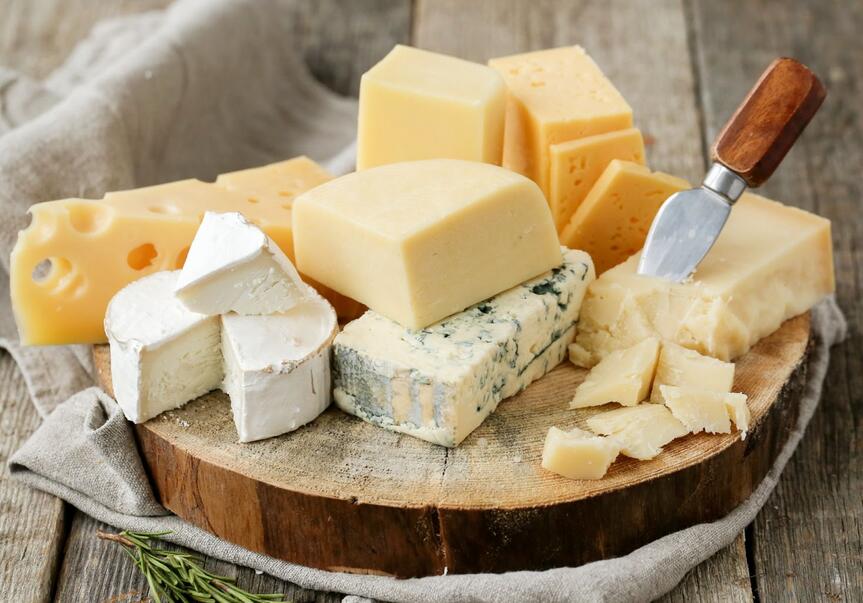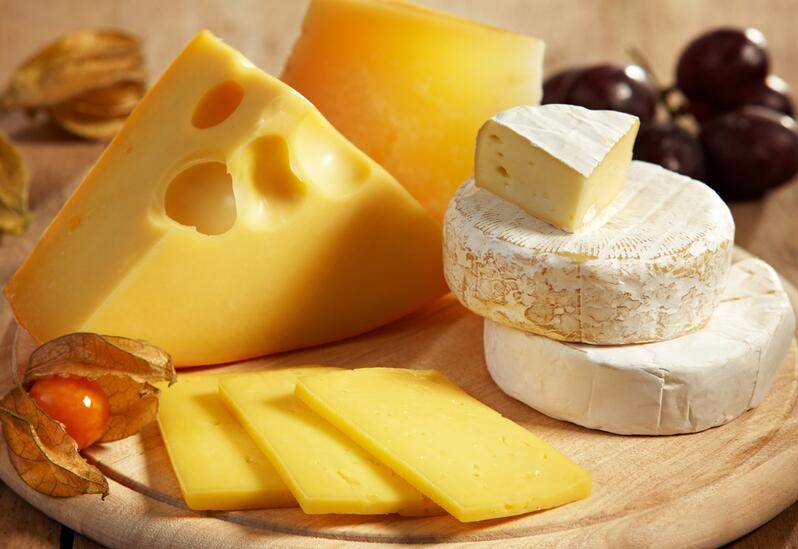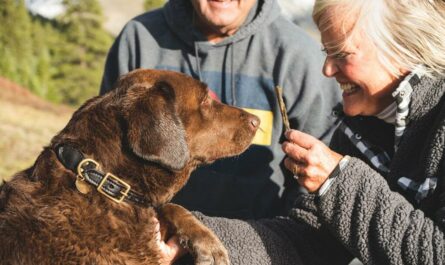When it comes to our furry friends, it’s natural to want to share our favorite foods with them. Cheese is a popular and delicious treat enjoyed by many humans, but can dogs eat cheese safely? The answer is not a simple yes or no. While cheese can be a tasty and nutritious addition to your dog’s diet when given in moderation, there are important factors to consider before offering it to your canine companion. In this article, we will explore whether dogs can eat cheese, and what types of cheese are safe for them.
What is Cheese and its Health Benefits For Dogs?
Cheese is a dairy product made from the milk of various animals, such as cows, goats, or sheep. When it comes to dogs, cheese can be a tasty and nutritious treat when given in moderation. Here are some potential health benefits of cheese for dogs:
1. Protein
Cheese is a good source of protein, which is essential for dogs as it helps build and repair tissues, supports muscle development, and plays a role in the production of enzymes and hormones. Protein is particularly important for active and growing dogs, as well as those recovering from injuries or illnesses.
However, it’s important to note that not all cheeses are created equal in terms of protein content. Cottage cheese and mozzarella are examples of cheese with higher protein content compared to softer varieties like brie or cream cheese.
2. Calcium
Cheese is rich in calcium, a mineral that plays a vital role in maintaining strong bones and teeth in dogs. Adequate calcium intake is crucial for growing puppies, as it supports proper bone development.
Additionally, calcium helps prevent conditions like osteoporosis and dental issues in dogs of all ages. However, it’s important to note that while calcium is necessary, excessive amounts can lead to imbalances and health issues. Moderation is key when feeding cheese to your dog.
3. Vitamins and Minerals
Cheese contains various vitamins and minerals that contribute to overall canine health. For example, it is a good source of vitamin A, which supports vision, immune function, and skin health.
Cheese also provides vitamin B12, which is important for nerve function and the production of red blood cells. Additionally, it contains minerals like phosphorus and zinc, which are necessary for bone health, cell function, and immune system support.
4. Probiotics
Some types of cheese, such as cottage cheese or certain aged cheeses, contain probiotics. Probiotics are beneficial bacteria that can help support a healthy digestive system in dogs.
They promote a balanced gut flora, aid in digestion, and can help alleviate some gastrointestinal issues, such as diarrhea or constipation. However, it’s important to introduce probiotic-rich cheese gradually to avoid any digestive upsets, and not all dogs tolerate cheese or probiotics well. Always monitor your dog’s reaction and consult with your veterinarian if you have any concerns.
5. Mental Stimulation
The strong aroma and flavor of cheese make it an excellent option for training or use as a reward during obedience exercises. The enticing nature of cheese can provide mental stimulation for your dog. This makes training sessions more enjoyable and effective.
However, it’s important to use cheese in moderation and consider the overall calorie intake of your dog’s diet. Balance the use of cheese with other healthy treats and rewards to maintain a well-rounded diet.

Can Dogs Eat Cheese Safely? Risks of Feeding Cheese to Dogs
While cheese can be enjoyed by some dogs, it’s important to be aware of the potential risks associated with feeding cheese to dogs. Here are some considerations:
1. Lactose Intolerance
Many dogs are lactose intolerant, which means they lack the necessary enzyme lactase to break down lactose, the sugar found in milk and dairy products. Feeding cheese to lactose-intolerant dogs can result in digestive upset, including gas, bloating, diarrhea, or stomach discomfort. If your dog shows signs of lactose intolerance, it’s best to avoid feeding them cheese or any other dairy products.
2. High Fat Content
Cheese can be high in fat, especially in certain varieties like cheddar or Swiss. While fat is an important part of a balanced diet for dogs, excessive intake can lead to weight gain, pancreatitis, or other digestive issues. It’s crucial to feed cheese in moderation and choose low-fat options when offering it to your dog.
3. Obesity and Weight Gain
Cheese is high in fat and calories, which can contribute to weight gain and obesity in dogs. This is especially concerning for dogs that are already overweight or prone to obesity-related health issues such as high blood pressure and diabetes.
4. Sodium Content
Some types of cheese, particularly processed or flavored varieties, can be high in sodium. Excessive sodium intake can lead to dehydration, electrolyte imbalances, or increased blood pressure in dogs. It’s best to choose low-sodium cheese options or feed cheese sparingly to avoid these risks.
5. Choking Hazards
Some types of cheese, especially harder or aged varieties, can be dense and have a sticky texture. This can pose a choking hazard, particularly for small dogs or those prone to gulping their food. It’s important to cut cheese into small, manageable pieces or choose softer cheese options to minimize the risk of choking.
6. Allergies and Sensitivities
Dogs, like humans, can develop allergies or sensitivities to certain types of food, including cheese. Common allergens in cheese include cow’s milk proteins or additives.
If your dog experiences symptoms such as itching, skin rashes, ear infections, or gastrointestinal issues after consuming cheese, it may be a sign of an allergic reaction or sensitivity. In such cases, it’s important to avoid feeding cheese and consult with your veterinarian for guidance.
Types of Cheese Dogs Can Eat
While there are potential risks associated with feeding cheese to dogs, certain types of cheese can offer health benefits to your furry friend when consumed in moderation. Let’s take a closer look at some popular types of cheese and the potential benefits they can provide.
1. Mozzarella
Mozzarella, a common cheese found in many households, can be a good source of calcium for dogs. It contains approximately 18.3 mg of calcium per 1 ½ oz serving, which can contribute to your dog’s bone health. Additionally, mozzarella contains vitamins A and D, along with other essential nutrients such as phosphorus, potassium, protein, and sodium.
2. Cheddar
Cheddar cheese, known for its sharp flavor, can be a tasty treat for your dog. It contains lower levels of lactose compared to some other types of cheese, making it easier for dogs to digest.
Cheddar cheese is also a good source of calcium, protein, potassium, and zinc, all of which are essential for a dog’s overall health.
3. Gouda
Gouda cheese is another option to consider when it comes to treating your dog with cheese. It is a good source of protein and calcium, which are vital for muscle development and bone strength.
However, it’s important to note that gouda cheese can potentially cause diarrhea in dogs. Therefore, it should be given in moderation to avoid any digestive issues.
4. Swiss
Swiss cheese, known for its distinctive flavor and appearance, can also be included in your dog’s diet in moderation. It contains reasonable amounts of vitamins A and D, along with calcium and phosphorus. These nutrients are important for your dog’s overall health and well-being.
5. Feta
Feta cheese, made from sheep, goat, or cow’s milk, has a strong and salty taste. It can be a flavorful addition to your dog’s diet when given in moderation.
Feta cheese is high in calcium, with approximately 19.5 mg per 1 ½ oz of cheese. Calcium is essential for maintaining strong bones and teeth in dogs.

Types of Cheese to Avoid Feeding Your Dog
While some types of cheese can be enjoyed by dogs in moderation, there are certain varieties that should be avoided due to potential health risks. Here are some types of cheese to avoid feeding your dog:
1. Soft or Moldy Cheese
Soft cheeses like brie, camembert, or blue cheese should be avoided. These cheeses have a higher moisture content and can harbor harmful bacteria such as Listeria or E. coli, which can cause digestive upset, food poisoning, or other serious health issues in dogs.
2. Cheese with Additives or Seasonings
Cheeses that contain added ingredients like onions, garlic, herbs, or spices should be avoided. These additives can be toxic to dogs and may cause gastrointestinal problems, anemia, or other adverse reactions. Always check the ingredients label before offering cheese to your dog.
3. High-fat or High-Sodium Cheese
Cheese varieties that are particularly high in fat or sodium content should be limited or avoided altogether. Examples include cheddar, Swiss, or processed cheese slices. Excessive fat or sodium intake can lead to weight gain, pancreatitis, or other digestive issues in dogs.
4. Flavored or Spicy Cheese
Cheese varieties with added flavors such as jalapeño, pepper jack, or smoked cheese should not be fed to dogs. Spicy ingredients or seasonings can cause gastrointestinal upset, irritation, or even allergic reactions in dogs.
5. Cheese with Rinds
Cheese with rinds, such as parmesan or gouda, should not be given to dogs. The rind can be difficult to digest and may cause intestinal blockages or choking hazards, especially for small dogs.
6. Processed Cheese Products
Processed cheese products like cheese spreads, cheese dips, or cheese sauces often contain additional additives, preservatives, or artificial ingredients that can be harmful to dogs. These products are typically high in fat, sodium, and other unhealthy additives.

Recommended Serving Size and Frequency
When it comes to feeding cheese to dogs, it is important to keep in mind that moderation is key. Cheese can be high in calories and fat, so it should only be given as an occasional treat and in small amounts. The recommended serving size for cheese varies depending on the size and weight of your dog.
Here’s a table outlining recommended serving sizes and frequency for feeding cheese to dogs:
| Dog Size | Serving Size | Frequency |
|---|---|---|
| Small (up to 20 lbs) | 1 to 2 small cubes or slices | 1 to 2 times per week |
| Medium (20-50 lbs) | 2 to 3 small cubes or slices | 1 to 2 times per week |
| Large (50-90 lbs) | 3 to 4 small cubes or slices | 1 to 2 times per week |
| Giant (90+ lbs) | 4 to 5 small cubes or slices | 1 to 2 times per week |
Please note that these serving sizes and frequencies are general guidelines. The actual amount of cheese you can offer to your dog may vary depending on their individual dietary needs, activity level, and overall health.
1. Moderation is Key
While cheese can be a tasty treat for dogs, it should not make up a significant portion of their diet. Overfeeding cheese to dogs can lead to weight gain and associated health issues. Therefore, it is important to limit the amount of cheese you give your dog. As a general rule of thumb, cheese should make up no more than 10% of your dog’s daily caloric intake.
2. Cheese for Puppies vs Adult Dogs
Puppies have different nutritional needs than adult dogs. While cheese can be a great training tool for puppies, it should still be given in moderation. Puppies require a balanced diet that is rich in protein and other essential nutrients to support their growth and development. Therefore, cheese should only be given as an occasional treat to puppies and in small amounts.
Adult dogs, on the other hand, can tolerate cheese better than puppies. However, it is still important to limit the amount of cheese you give your dog. If your dog is overweight or has a history of pancreatitis, it is best to avoid feeding them cheese altogether.
3. Alternatives to Cheese
If your dog is lactose intolerant or you simply want to avoid feeding them cheese, there are plenty of other healthy and tasty treat options available. Here are some alternatives to cheese that you can consider:
- Carrots: Carrots are a great low-calorie treat option for dogs. They are high in fiber, vitamin A, and beta-carotene, which is good for their vision. You can feed your dog raw or cooked carrots as a snack or mix them with their regular food.
- Peanut Butter: Peanut butter is a popular treat option for dogs. It is high in protein, healthy fats, and vitamins B and E. However, make sure you choose a brand that does not contain xylitol, which is toxic to dogs. Also, peanut butter is high in calories, so make sure you feed it to your dog in moderation.
- Almonds: Almonds are a good source of protein, fiber, and healthy fats. However, they are also high in calories, so make sure you feed them to your dog in moderation. Also, make sure you feed your dog only plain, unsalted almonds.
- Dog Food: You can also use your dog’s regular food as a treat option. Just make sure you adjust their daily food intake accordingly. You can also find dog treats that are specifically designed for training and rewarding purposes.
In conclusion, there are plenty of healthy and tasty alternatives to cheese that you can feed your dog. Just make sure you choose options that are safe and appropriate for their diet and lifestyle.
What to Do If Your Dog Eats Harmful Cheese?
If you suspect that your dog has eaten harmful cheese, it is important to take action right away. Here are some steps you should take:
The first thing you should do is to recognize the symptoms of distress. If your dog has eaten cheese that is harmful to them, they may experience symptoms such as vomiting, diarrhea, seizures, and an upset stomach. If you notice any of these symptoms, it is important to act quickly.
When to Contact Your Veterinarian?
If you suspect that your dog has eaten harmful cheese, you should contact your veterinarian right away. They can help you determine whether your dog needs medical attention and what steps you should take to help them recover.
If your dog is experiencing severe symptoms such as seizures or difficulty breathing, you should take them to the vet immediately. In less severe cases, your vet may recommend that you monitor your dog’s symptoms and provide them with supportive care such as fluids and a bland diet.
Conclusion
So, can dogs eat cheese? Yes, Dogs can eat cheese in moderation, but it’s important to keep a few things in mind. Cheese can be high in fat and calories, leading to weight gain and digestive issues if fed in excess. (Resource)
Additionally, some dogs may be lactose intolerant and have difficulty digesting dairy products like cheese, which can cause gastrointestinal upset. If you decide to feed your dog cheese, it’s best to do so in small quantities and to monitor their reaction. It’s also important to choose low-fat, low-sodium varieties of cheese and avoid those high in seasonings or additives.





